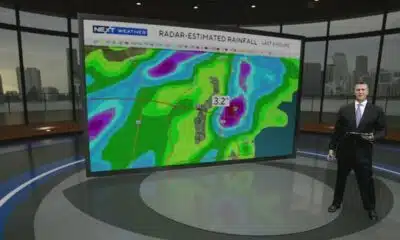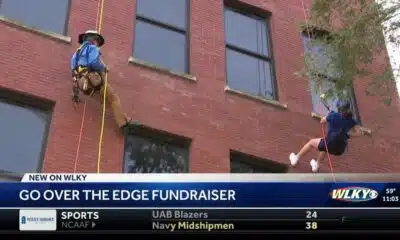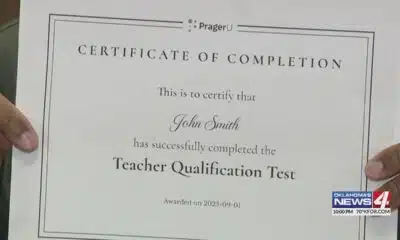News from the South - West Virginia News Feed
‘How we ended up here’: Authors on effects of abortion bans
by Sofia Resnick, West Virginia Watch
May 29, 2025
During the pandemic, when many people were reevaluating their life goals, Colleen Long texted her childhood best friend and fellow journalist Rebecca Little to see if, together, they could write a relatable, even funny, book about pregnancy loss.
“My friend Rebecca … she likes to say she kind of had the pu pu platter of loss,” Long said during an author panel at the 2025 Gaithersburg Book Festival in Gaithersburg, Maryland, on May 17. “She had all sorts of terrible things happen: a stillbirth; she had to end the pregnancy of twins; she had several miscarriages. And I had a stillbirth.”
They wanted to understand why it was so hard to talk about pregnancy loss in public, and thus difficult to process.
“She and I started talking about how what we would really like to do is to write a book about why we are so bad at talking about pregnancy loss,” said Long, a senior editor at NBC News. “What is it about our culture that makes it impossible to sort of discuss this, and yet, when it happens to you, then all of these people come out of the woodwork and talk about it. We’re saying it’s like ‘Fight Club,’ but maybe we should be taking fewer cues, you know, from Brad Pitt.”
Long and Little ended up speaking to about 100 people who experienced some form of pregnancy loss and continue to hear from people with experiences since their book, “I’m Sorry for My Loss: An Urgent Examination of Reproductive Care in America,” came out last year. Their book is also about how the U.S. Supreme Court’s reversal of federal abortion rights in June 2022, with the Dobbs v. Jackson Women’s Health Organization decision, has exacerbated the consequences when pregnancy doesn’t go the way it’s supposed to. In the book, Little and Long document how pregnant and miscarrying women have been denied standard medical treatments because of state abortion bans, and how many people — disproportionately people of color — have been criminalized for decisions made while pregnant, long before Dobbs.
“In some ways, reproduction in America has been stripped back to basics, but we don’t find ourselves suddenly reliving a colonial life,” they write. “We would argue it’s more perverse in some ways because the advances in medicine are available, but they’re being withheld. Like the Back to the Future timeline where Biff Tannen runs a dystopian Hill Valley, we’re going back to a place we never really were.”
Subscribe to Reproductive Rights Today
Want a better understanding of abortion policy in the states? Sign up for our free national newsletter. Reproductive Rights Today is a comprehensive daily wrap-up of changes to reproductive rights in the states, the front lines in the fight over abortion access in a Post-Roe America.
Joining the panel was The 19th’s Amanda Becker, whose “You Must Stand Up: The Fight for Abortion Rights in Post-Dobbs America,” also published in 2024, tells the story of the first year after Roe v. Wade was overturned, from the perspective of abortion providers and reproductive rights activists.
“I truly think a lot of the people I feature in my book are heroes,” Becker said. “Being around them was just so incredibly inspiring, and how hard they’re working to help people and take care of people and preserve the ability to access care where people can still get it, and fighting to get it back where they can’t.”
States Newsroom reporter Sofia Resnick moderated the Q&A with the authors. The version below has been edited for brevity and clarity. The full conversation is scheduled to be broadcast on C-SPAN 2 Book TV on June 8.
States Newsroom: You both were working on these books before the Dobbs decision and you’ve been both covering major national stories. Why did you both decide to dedicate so much time to this particular story?
Colleen Long: When Roe fell, it really sort of informed our reporting in a different way, because a lot of the procedures that are used to treat pregnancy loss are used to treat abortion. So, our book was focused more on pregnancy loss. But really, our sort of principle for the book is, what has happened in the past 50 years — since Roe has been codified and now fallen — is that we sort of hold out everything that isn’t a perfect pregnancy or the end of an unwanted pregnancy. But there’s this vast middle ground that a lot of people tend to experience. … When Roe fell, everybody was like, “Oh, this is not going to affect miscarriage care. This could possibly not affect a woman who is wanting a pregnancy and is unable to continue her pregnancy.” And so what we’ve seen, obviously, since the fall of Roe, is that actually these things are all very much intertwined. So our idea was to better inform everyone.
Amanda Becker: My background is as a political reporter, not a health care reporter. So I was more interested in how reproductive rights, and abortion specifically, have really reordered our politics. It’s the biggest political story of my lifetime, and because I’m a person that was capable of giving birth, I also thought it was the most important story overall that affects more than half of this country directly. And I would argue that it affects everyone indirectly in some way.
I just knew it was going to be a very big year, and that’s why I decided to structure the book — it literally starts with the decision in June, and it ends the next June — because it was just such a sprawling story that I knew would affect every single state in a different way, and the residents in those states in different ways.
SN: What were the parts of your books that were hardest to write?
Long: Rebecca trained at [the famed Chicago improv theater] Second City, so she’s funny, she will be the first to tell you. We wanted to make this book readable … so we worked on the tone a lot. That said, the hardest part about writing this book was interviewing the people. We interviewed 100 different people, and they ran the gamut. Some experienced a miscarriage, some had a stillbirth, some had multiple stillbirths. Some had to end their pregnancies because of a host of reasons. We interviewed people from every religion, conservative people, liberal people, all kinds of different people, and it was hard. As a journalist, you are used to listening to people and hearing stories that are upsetting, but I think the thing that was most upsetting for us was how common a lot of their stories were in that they all felt, like, alone, unsure, didn’t know where to go.
Becker: I was trying to write a book that was ultimately hopeful. … I would say the most difficult points were just, like, the overwhelmingness of what was happening that year. And because my book is kind of looking at the loss of abortion rights as happening in tandem with the erosion of our democracy, which is something I care a lot about, it just would start to feel overwhelming sometimes. Like, how are we going to fix these things that have been happening over the last 100 years, you know? How can we get reproductive rights back unless we fix gerrymandering?
SN: In your respective historical research, what were some things that surprised you?
Becker: I was floored when I found out that the American Medical Association came into being to elevate male doctors over female midwives and then go on an anti-abortion crusade over the next 30 years that eventually changed the laws in almost every state in this country.
[Addressing Long:]And you get into this in your book, too: The father of gynecology did non-consensual experiments without anesthesia on enslaved women. And I’m learning this history of women’s healthcare and gynecological care and being like, this is how we ended up here.
Long: We have a long history in the beginning of our book — it’s literally called “How We Got Here” — to sort of explain how our attitudes have changed over the years on pregnancy and pregnancy loss. Because, for example, the way we view pregnancy — this was really surprising to me — the way we view pregnancy today is really only like 47 to 48 years old, and it has to do so much with modern medical advances, sonograms, the home pregnancy test. Our ideas about how we bond and the way we discuss pregnancy is just so different.
SN: What have been some of the impacts of increased anti-abortion laws on health care and grief and loss?
Long: My OB-GYN came from Oklahoma [where abortion is banned] because she was, like, “I feel as though I can’t practice safely.” … And the other thing we’re noticing is that doctors — not OB-GYNs, but like any doctors — they’re considering where to go to medical school. And the states in which the abortion laws are very strict, they’re sort of looking away from those states because … they’re afraid of their own medical care. So I would expect us in — I don’t know, five years, maybe, let’s say six years — we’re going to start seeing like a real disparate situation in the United States, where we have some states with very good medical care, and other states, which, let’s face it, already had poor medical care, are going to have worse medical care.
Becker: You don’t find out about a lot of really bad fetal abnormalities until the 20- to 21-week anatomy scan, so [people] made really difficult decisions, and a lot of them that I’ve spoken to feel like they can’t even grieve that openly because of what’s in the public discourse right now about abortion and abortion bans. Yes, they had an abortion, but they’re grieving a pregnancy that they very much wanted and a child that they very much wanted, and I think it’s just making it more difficult for people to talk about.
Long: This is where politics is tricky. … We interviewed a lot of women who identified as politically left-leaning who felt they weren’t allowed to mourn their miscarriage because they didn’t want to be seen as a traitor to the cause of abortion rights, which is hard.
And then … you have what has happened with the restrictions and the fetal personhood laws. … This is a very new concept, to have the sort of baby and the mother have the same legal rights, and that’s what we’re seeing play out in some of these places. And it plays out in really strange ways. Because when you have a life or death situation and you have these two entities, one does not exist without the other. And like, who is worth saving more? It’s just a really complicated morass.
Becker: If you talk to experts, both legal and medical, in fetal personhood and what it means in practice, they will tell you that in a fetal personhood situation where you’re putting at odds the rights of a fetus versus the right of the gestational parent, the fetus always wins when we apply fetal personhood. And so we’re going to see more and more of that.
Audience Member: It seems to me that in the last political campaign, we started to hear a lot about the impact of these laws on women, and somehow that’s fallen out of the news. And so how do we mobilize around this issue?
Becker: I think we were hearing about it in part because it was an election season and a presidential election, and I would expect that to come back around for the midterms and the next time we have a lot of abortion ballot measures on ballots. … Politicians pay attention to what gets them elected or not elected. So if that’s a reason you’re going to elect someone or not elect them, let them know that.
Long: I covered the [presidential] campaign, and like even during the campaign, I felt like these issues sort of only caught fire when they thought it could be a winning issue. And the Democrats are in a weird rebuilding phase right now, and so I think they’re trying to figure out what works and what doesn’t. … They were really hoping that reproductive rights and reproductive health was going to drive people to the polls, in particular women, and in the end, they lost. … And the conversation is no longer happening. But if you think about it, the conversation was never happening. It only just started happening, and then it was a blip. And then now we’re sort of back to where we were, which is super annoying.
West Virginia Watch is part of States Newsroom, a nonprofit news network supported by grants and a coalition of donors as a 501c(3) public charity. West Virginia Watch maintains editorial independence. Contact Editor Leann Ray for questions: info@westvirginiawatch.com.
The post ‘How we ended up here’: Authors on effects of abortion bans appeared first on westvirginiawatch.com
Note: The following A.I. based commentary is not part of the original article, reproduced above, but is offered in the hopes that it will promote greater media literacy and critical thinking, by making any potential bias more visible to the reader –Staff Editor.
Political Bias Rating: Center-Left
This content centers around reproductive rights, highlighting the challenges faced after the Dobbs decision that reversed federal abortion protections. It emphasizes stories of miscarriage and pregnancy loss while linking the legal and medical consequences of anti-abortion laws with broader issues of healthcare access and social justice. The views expressed show sympathy for reproductive rights advocates and critique policies that restrict abortion access, aligning the narrative with a progressive, reproductive rights supportive stance typically found in center-left discourse. However, the tone remains largely factual and focused on personal narratives and policy impacts, without overtly radical language or strong partisan attacks, reflecting a center-left lean rather than far-left.
News from the South - West Virginia News Feed
National Grandparents Day (9-7-25) and the special bond shared with their grandchildren
SUMMARY: This Sunday, September 7th, is National Grandparents Day, honoring the special bond between grandparents and grandchildren. In Milton State, many grandparents become primary caregivers due to their children’s substance abuse disorders. Presley Ridge highlights the vital role grandparents play in foster care, offering training and support to become certified foster parents. West Virginia leads the nation in child removals, resulting in many grandparents raising grandchildren full-time. Services aim to reunify families by supporting parents’ recovery. Children thrive better in familiar grandparent homes, providing love and stability. Senator Brian Hilton emphasizes improving treatment programs to help families heal and support grandparents effectively.
National Grandparents Day is a time to appreciate the joy and wisdom they bring to our lives. Mountain State grandparents often take on another role, stepping in to become primary caregivers when their children have substance abuse issues.
~ Newswatch reporter Jillian Risberg (https://www.facebook.com/JillianRisTV) found out how much love, guidance, and stability grandparents can provide.
FOLLOW US ON FACEBOOK AND TWITTER:
https://facebook.com/WOAYNewsWatch
https://twitter.com/WOAYNewsWatch
News from the South - West Virginia News Feed
WV Supreme Court will hear BOE’s appeal in vaccine lawsuit — but not right away
by Lori Kersey, West Virginia Watch
September 5, 2025
West Virginia’s highest court will take on a legal battle over the state’s school vaccination requirements, but it denied a request by state school officials that it do so quickly.
The state Supreme Court on Thursday set a deadline of Dec. 12 for the West Virginia Board of Education to prepare its appeal of a Raleigh County judge’s July ruling against it. That ruling was in regards to a lawsuit brought by three Raleigh County families over the board’s refusal to accept religious exemptions to the state’s mandatory school vaccine requirements.
Raleigh County Circuit Judge Michael Froble in July granted a preliminary injunction in the case that allows students in the case to attend class with a religious exemption to the vaccination requirements.
The school board had filed notice of appeal and asked the high court to both expedite a review of the appeal and temporarily halt the proceedings in the lower court.
In the scheduling order Thursday, the court denied both motions. Justices also set a deadline of Jan. 26 for the plaintiffs in the case to respond to the board’s appeal. The board will then have until Feb. 16, 2026 to write a reply, if necessary.
After the Feb. 16 reply brief deadline, the court writes, the appeal will be ready for review.
The Raleigh lawsuit is one case in a legal battle over religious freedom and the state’s strict school vaccination requirements. Every state requires school students to be vaccinated against a number of infectious diseases including polio, chicken pox and measles. Florida officials announced this week plans to eliminate its vaccine mandates.
West Virginia has been one of only five states that have not allowed students to opt out of the shots because of their religious or philosophical objections to them.
West Virginia Gov. Patrick Morrisey issued an executive order on his second day in office requiring the state to allow religious exemptions. His order is based on the 2023 Equal Protection for Religion Act. He argues that the religious freedom law, when read alongside the vaccination law, calls for the religious exemptions.
Morrisey has not rescinded that executive order, even though the state Legislature earlier this year rejected a bill that would have established those religious exemptions in state code.
Raleigh County Circuit Judge Michael Froble has scheduled a two-day hearing next week on a permanent injunction in the lawsuit, which he recently consolidated with a lawsuit brought against the state health department by two parents of immunocompromised students over its issuance of religious exemptions. Plaintiffs in that case are represented by the ACLU of West Virginia and Mountain State Justice.
The hearing is set for Sept. 10 and 11 at the Raleigh County Judicial Center. During that hearing, the judge has said he wants to consider issues that include whether the state’s vaccination law is constitutional without religious exemptions and the authority of Morrisey’s executive order.
YOU MAKE OUR WORK POSSIBLE.
West Virginia Watch is part of States Newsroom, a nonprofit news network supported by grants and a coalition of donors as a 501c(3) public charity. West Virginia Watch maintains editorial independence. Contact Editor Leann Ray for questions: info@westvirginiawatch.com.
The post WV Supreme Court will hear BOE’s appeal in vaccine lawsuit — but not right away appeared first on westvirginiawatch.com
Note: The following A.I. based commentary is not part of the original article, reproduced above, but is offered in the hopes that it will promote greater media literacy and critical thinking, by making any potential bias more visible to the reader –Staff Editor.
Political Bias Rating: Centrist
The content presents a factual and balanced overview of the legal dispute surrounding vaccine exemptions in West Virginia without evident partisan language or framing. It reports on actions taken by government officials, court decisions, and ongoing lawsuits from multiple perspectives, including those of the state board, families, and advocacy groups. The neutral tone and focus on legal developments suggest a centrist approach, aiming to inform rather than persuade toward a particular political viewpoint.
News from the South - West Virginia News Feed
Christian’s Morning Forecast: Strong to Severe Storms Incoming
SUMMARY: Storm Watch meteorologist Christian Boler reports strong to severe storms approaching West Virginia, especially McDow, Tazewell, and Wyoming counties during the morning commute. Temperatures will remain in the upper 60s to low 70s with southwest winds around 5-10 mph. A marginal severe weather threat exists across the region, mainly involving winds and flooding, but no tornadoes or hail expected. Rainfall of a quarter to half an inch is likely over 48 hours with isolated downpours. Storms will arrive in two waves before clearing Friday. Another front may bring showers Saturday, but high pressure will clear skies for the weekend and beyond.
FOLLOW US ON FACEBOOK AND TWITTER:
https://facebook.com/WOAYNewsWatch
https://twitter.com/WOAYNewsWatch
-
News from the South - Louisiana News Feed7 days ago
‘They broke us down’: New Orleans teachers, fired after Katrina, reflect on lives upended
-
Mississippi Today6 days ago
Trump proposed getting rid of FEMA, but his review council seems focused on reforming the agency
-
News from the South - Tennessee News Feed6 days ago
Tennessee ranks near the top for ICE arrests
-
News from the South - Missouri News Feed6 days ago
Missouri joins dozens of states in eliminating ‘luxury’ tax on diapers, period products
-
News from the South - Alabama News Feed7 days ago
Alabama union leaders say they’re fighting for the state’s middle class
-
News from the South - Texas News Feed3 days ago
Texas high school football scores for Thursday, Sept. 4
-
News from the South - Arkansas News Feed6 days ago
Every fall there’s a government shutdown warning. This time it could happen.
-
News from the South - Oklahoma News Feed6 days ago
Test taker finds it's impossible to fail 'woke' teacher assessment









































